Service Quality in Tourism
VerifiedAdded on 2023/01/23
|9
|2397
|96
AI Summary
This study aims to discuss influence of service quality in tourism and on visitor intentions for revisit to destination and on development of industry. Various literature studies have been reviewed to understand service quality’s relevance to tourism and interpret the concept and dimension of service quality and then investigating the impact over customer fulfilment and intentions.
Contribute Materials
Your contribution can guide someone’s learning journey. Share your
documents today.
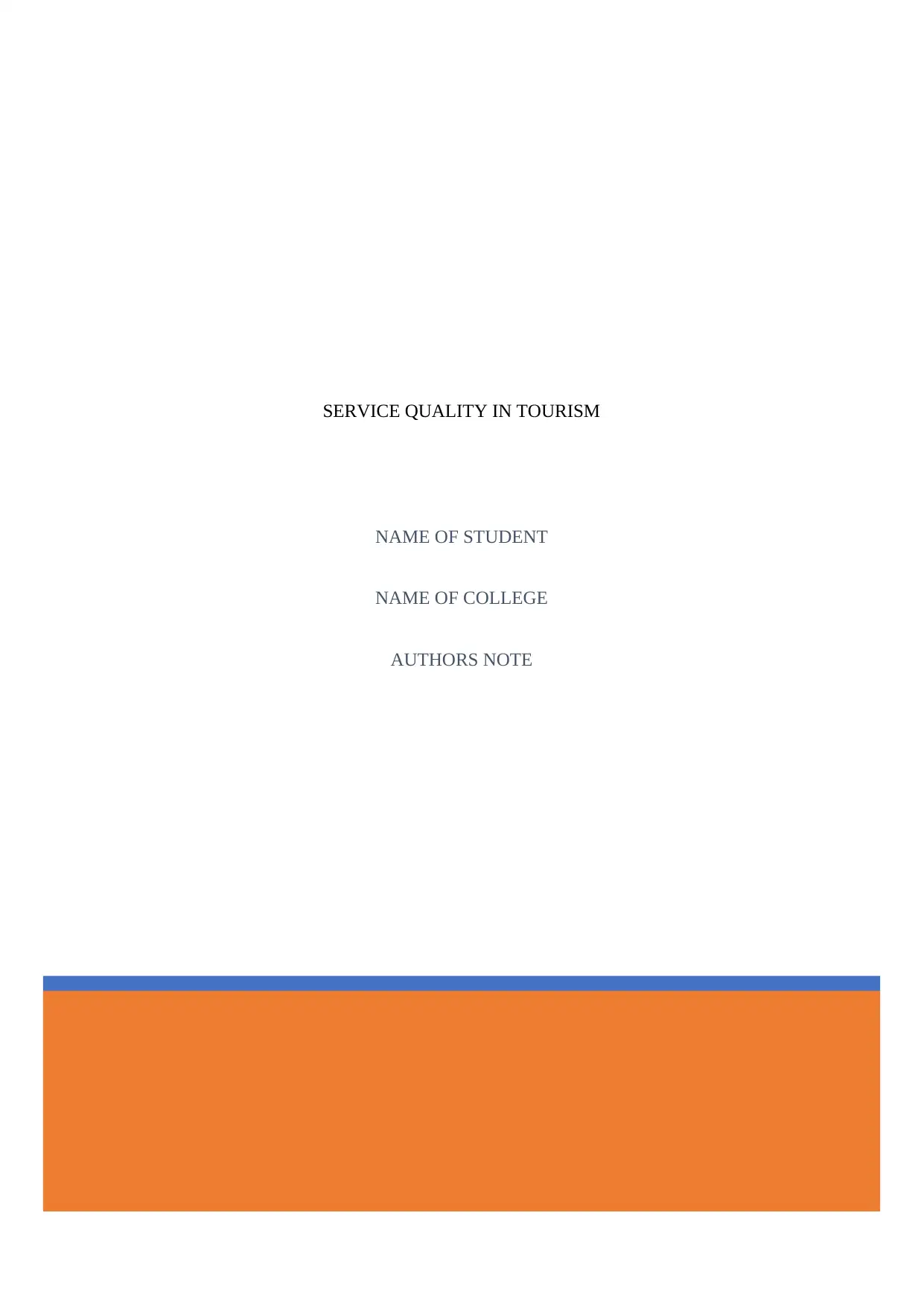
SERVICE QUALITY IN TOURISM
NAME OF STUDENT
NAME OF COLLEGE
AUTHORS NOTE
NAME OF STUDENT
NAME OF COLLEGE
AUTHORS NOTE
Secure Best Marks with AI Grader
Need help grading? Try our AI Grader for instant feedback on your assignments.
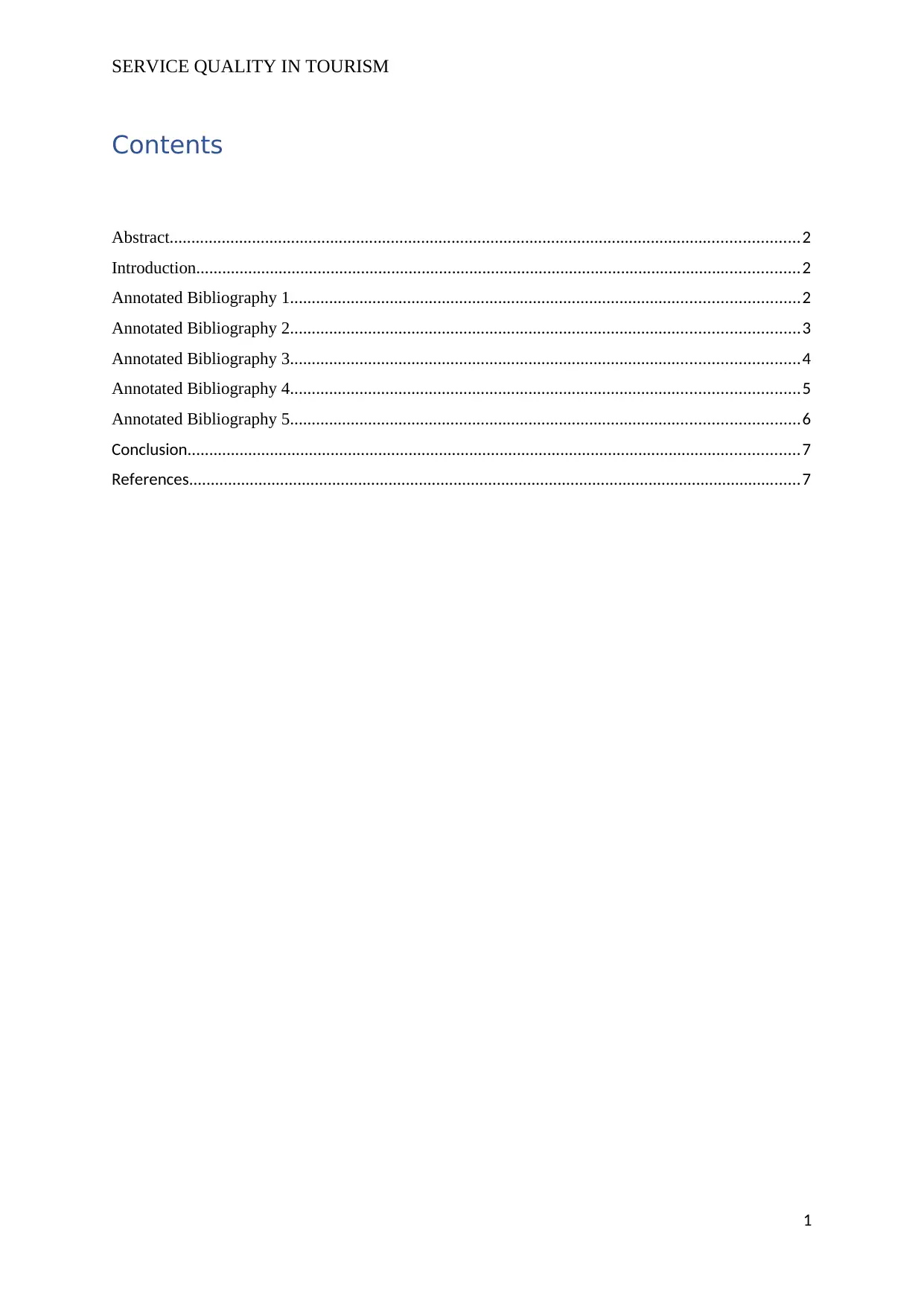
SERVICE QUALITY IN TOURISM
Contents
Abstract.................................................................................................................................................2
Introduction...........................................................................................................................................2
Annotated Bibliography 1.....................................................................................................................2
Annotated Bibliography 2.....................................................................................................................3
Annotated Bibliography 3.....................................................................................................................4
Annotated Bibliography 4.....................................................................................................................5
Annotated Bibliography 5.....................................................................................................................6
Conclusion.............................................................................................................................................7
References.............................................................................................................................................7
1
Contents
Abstract.................................................................................................................................................2
Introduction...........................................................................................................................................2
Annotated Bibliography 1.....................................................................................................................2
Annotated Bibliography 2.....................................................................................................................3
Annotated Bibliography 3.....................................................................................................................4
Annotated Bibliography 4.....................................................................................................................5
Annotated Bibliography 5.....................................................................................................................6
Conclusion.............................................................................................................................................7
References.............................................................................................................................................7
1
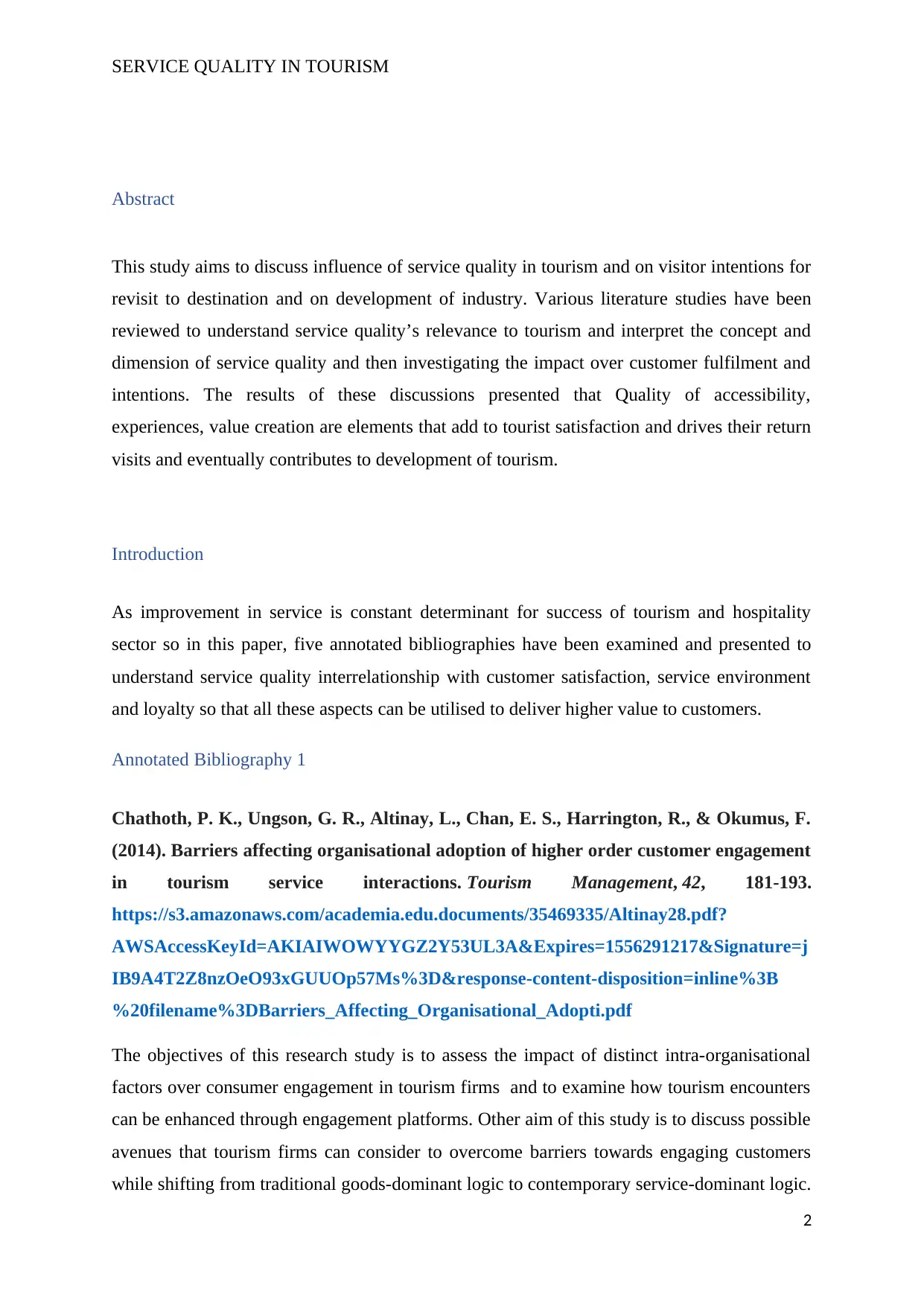
SERVICE QUALITY IN TOURISM
Abstract
This study aims to discuss influence of service quality in tourism and on visitor intentions for
revisit to destination and on development of industry. Various literature studies have been
reviewed to understand service quality’s relevance to tourism and interpret the concept and
dimension of service quality and then investigating the impact over customer fulfilment and
intentions. The results of these discussions presented that Quality of accessibility,
experiences, value creation are elements that add to tourist satisfaction and drives their return
visits and eventually contributes to development of tourism.
Introduction
As improvement in service is constant determinant for success of tourism and hospitality
sector so in this paper, five annotated bibliographies have been examined and presented to
understand service quality interrelationship with customer satisfaction, service environment
and loyalty so that all these aspects can be utilised to deliver higher value to customers.
Annotated Bibliography 1
Chathoth, P. K., Ungson, G. R., Altinay, L., Chan, E. S., Harrington, R., & Okumus, F.
(2014). Barriers affecting organisational adoption of higher order customer engagement
in tourism service interactions. Tourism Management, 42, 181-193.
https://s3.amazonaws.com/academia.edu.documents/35469335/Altinay28.pdf?
AWSAccessKeyId=AKIAIWOWYYGZ2Y53UL3A&Expires=1556291217&Signature=j
IB9A4T2Z8nzOeO93xGUUOp57Ms%3D&response-content-disposition=inline%3B
%20filename%3DBarriers_Affecting_Organisational_Adopti.pdf
The objectives of this research study is to assess the impact of distinct intra-organisational
factors over consumer engagement in tourism firms and to examine how tourism encounters
can be enhanced through engagement platforms. Other aim of this study is to discuss possible
avenues that tourism firms can consider to overcome barriers towards engaging customers
while shifting from traditional goods-dominant logic to contemporary service-dominant logic.
2
Abstract
This study aims to discuss influence of service quality in tourism and on visitor intentions for
revisit to destination and on development of industry. Various literature studies have been
reviewed to understand service quality’s relevance to tourism and interpret the concept and
dimension of service quality and then investigating the impact over customer fulfilment and
intentions. The results of these discussions presented that Quality of accessibility,
experiences, value creation are elements that add to tourist satisfaction and drives their return
visits and eventually contributes to development of tourism.
Introduction
As improvement in service is constant determinant for success of tourism and hospitality
sector so in this paper, five annotated bibliographies have been examined and presented to
understand service quality interrelationship with customer satisfaction, service environment
and loyalty so that all these aspects can be utilised to deliver higher value to customers.
Annotated Bibliography 1
Chathoth, P. K., Ungson, G. R., Altinay, L., Chan, E. S., Harrington, R., & Okumus, F.
(2014). Barriers affecting organisational adoption of higher order customer engagement
in tourism service interactions. Tourism Management, 42, 181-193.
https://s3.amazonaws.com/academia.edu.documents/35469335/Altinay28.pdf?
AWSAccessKeyId=AKIAIWOWYYGZ2Y53UL3A&Expires=1556291217&Signature=j
IB9A4T2Z8nzOeO93xGUUOp57Ms%3D&response-content-disposition=inline%3B
%20filename%3DBarriers_Affecting_Organisational_Adopti.pdf
The objectives of this research study is to assess the impact of distinct intra-organisational
factors over consumer engagement in tourism firms and to examine how tourism encounters
can be enhanced through engagement platforms. Other aim of this study is to discuss possible
avenues that tourism firms can consider to overcome barriers towards engaging customers
while shifting from traditional goods-dominant logic to contemporary service-dominant logic.
2
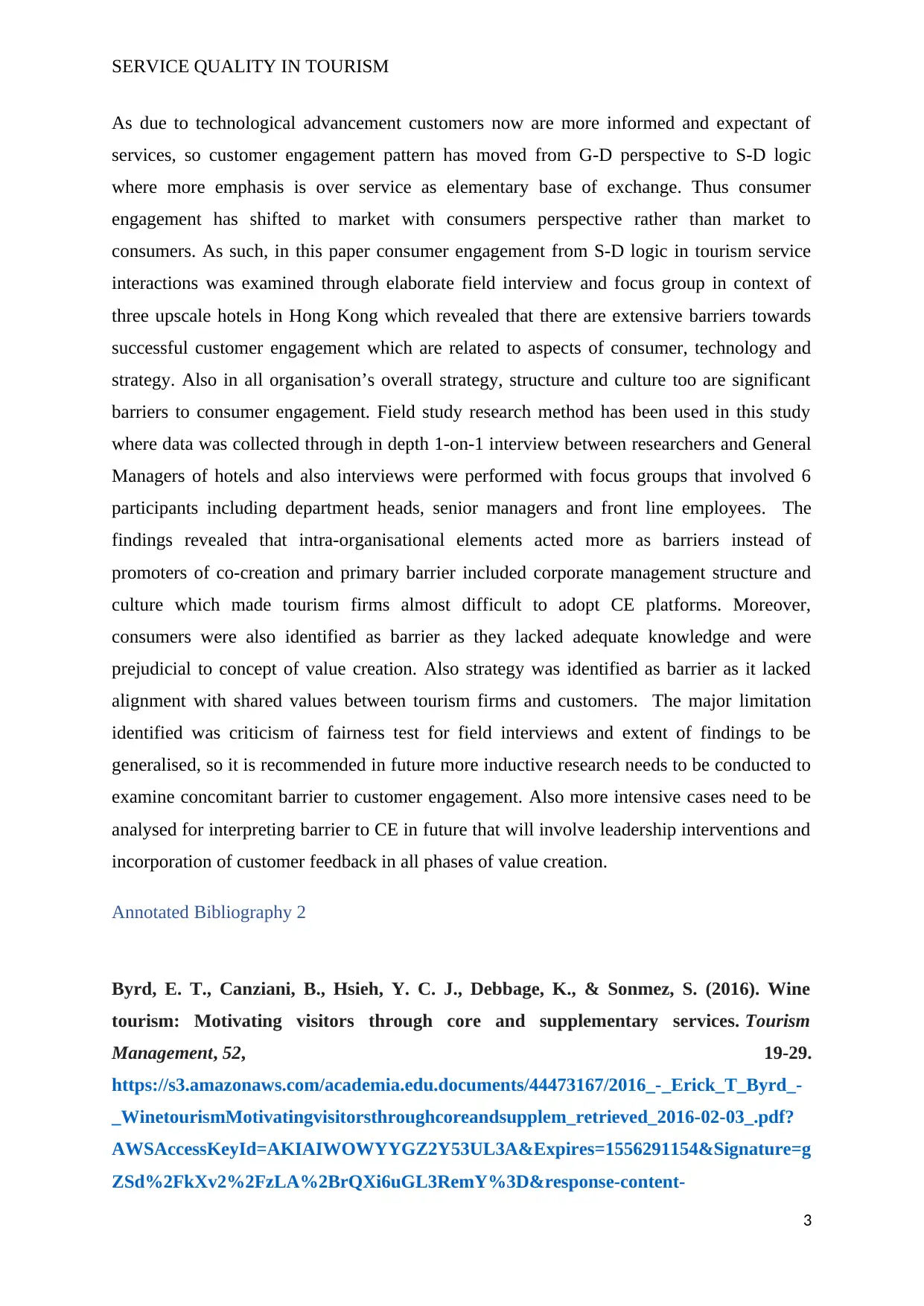
SERVICE QUALITY IN TOURISM
As due to technological advancement customers now are more informed and expectant of
services, so customer engagement pattern has moved from G-D perspective to S-D logic
where more emphasis is over service as elementary base of exchange. Thus consumer
engagement has shifted to market with consumers perspective rather than market to
consumers. As such, in this paper consumer engagement from S-D logic in tourism service
interactions was examined through elaborate field interview and focus group in context of
three upscale hotels in Hong Kong which revealed that there are extensive barriers towards
successful customer engagement which are related to aspects of consumer, technology and
strategy. Also in all organisation’s overall strategy, structure and culture too are significant
barriers to consumer engagement. Field study research method has been used in this study
where data was collected through in depth 1-on-1 interview between researchers and General
Managers of hotels and also interviews were performed with focus groups that involved 6
participants including department heads, senior managers and front line employees. The
findings revealed that intra-organisational elements acted more as barriers instead of
promoters of co-creation and primary barrier included corporate management structure and
culture which made tourism firms almost difficult to adopt CE platforms. Moreover,
consumers were also identified as barrier as they lacked adequate knowledge and were
prejudicial to concept of value creation. Also strategy was identified as barrier as it lacked
alignment with shared values between tourism firms and customers. The major limitation
identified was criticism of fairness test for field interviews and extent of findings to be
generalised, so it is recommended in future more inductive research needs to be conducted to
examine concomitant barrier to customer engagement. Also more intensive cases need to be
analysed for interpreting barrier to CE in future that will involve leadership interventions and
incorporation of customer feedback in all phases of value creation.
Annotated Bibliography 2
Byrd, E. T., Canziani, B., Hsieh, Y. C. J., Debbage, K., & Sonmez, S. (2016). Wine
tourism: Motivating visitors through core and supplementary services. Tourism
Management, 52, 19-29.
https://s3.amazonaws.com/academia.edu.documents/44473167/2016_-_Erick_T_Byrd_-
_WinetourismMotivatingvisitorsthroughcoreandsupplem_retrieved_2016-02-03_.pdf?
AWSAccessKeyId=AKIAIWOWYYGZ2Y53UL3A&Expires=1556291154&Signature=g
ZSd%2FkXv2%2FzLA%2BrQXi6uGL3RemY%3D&response-content-
3
As due to technological advancement customers now are more informed and expectant of
services, so customer engagement pattern has moved from G-D perspective to S-D logic
where more emphasis is over service as elementary base of exchange. Thus consumer
engagement has shifted to market with consumers perspective rather than market to
consumers. As such, in this paper consumer engagement from S-D logic in tourism service
interactions was examined through elaborate field interview and focus group in context of
three upscale hotels in Hong Kong which revealed that there are extensive barriers towards
successful customer engagement which are related to aspects of consumer, technology and
strategy. Also in all organisation’s overall strategy, structure and culture too are significant
barriers to consumer engagement. Field study research method has been used in this study
where data was collected through in depth 1-on-1 interview between researchers and General
Managers of hotels and also interviews were performed with focus groups that involved 6
participants including department heads, senior managers and front line employees. The
findings revealed that intra-organisational elements acted more as barriers instead of
promoters of co-creation and primary barrier included corporate management structure and
culture which made tourism firms almost difficult to adopt CE platforms. Moreover,
consumers were also identified as barrier as they lacked adequate knowledge and were
prejudicial to concept of value creation. Also strategy was identified as barrier as it lacked
alignment with shared values between tourism firms and customers. The major limitation
identified was criticism of fairness test for field interviews and extent of findings to be
generalised, so it is recommended in future more inductive research needs to be conducted to
examine concomitant barrier to customer engagement. Also more intensive cases need to be
analysed for interpreting barrier to CE in future that will involve leadership interventions and
incorporation of customer feedback in all phases of value creation.
Annotated Bibliography 2
Byrd, E. T., Canziani, B., Hsieh, Y. C. J., Debbage, K., & Sonmez, S. (2016). Wine
tourism: Motivating visitors through core and supplementary services. Tourism
Management, 52, 19-29.
https://s3.amazonaws.com/academia.edu.documents/44473167/2016_-_Erick_T_Byrd_-
_WinetourismMotivatingvisitorsthroughcoreandsupplem_retrieved_2016-02-03_.pdf?
AWSAccessKeyId=AKIAIWOWYYGZ2Y53UL3A&Expires=1556291154&Signature=g
ZSd%2FkXv2%2FzLA%2BrQXi6uGL3RemY%3D&response-content-
3
Secure Best Marks with AI Grader
Need help grading? Try our AI Grader for instant feedback on your assignments.
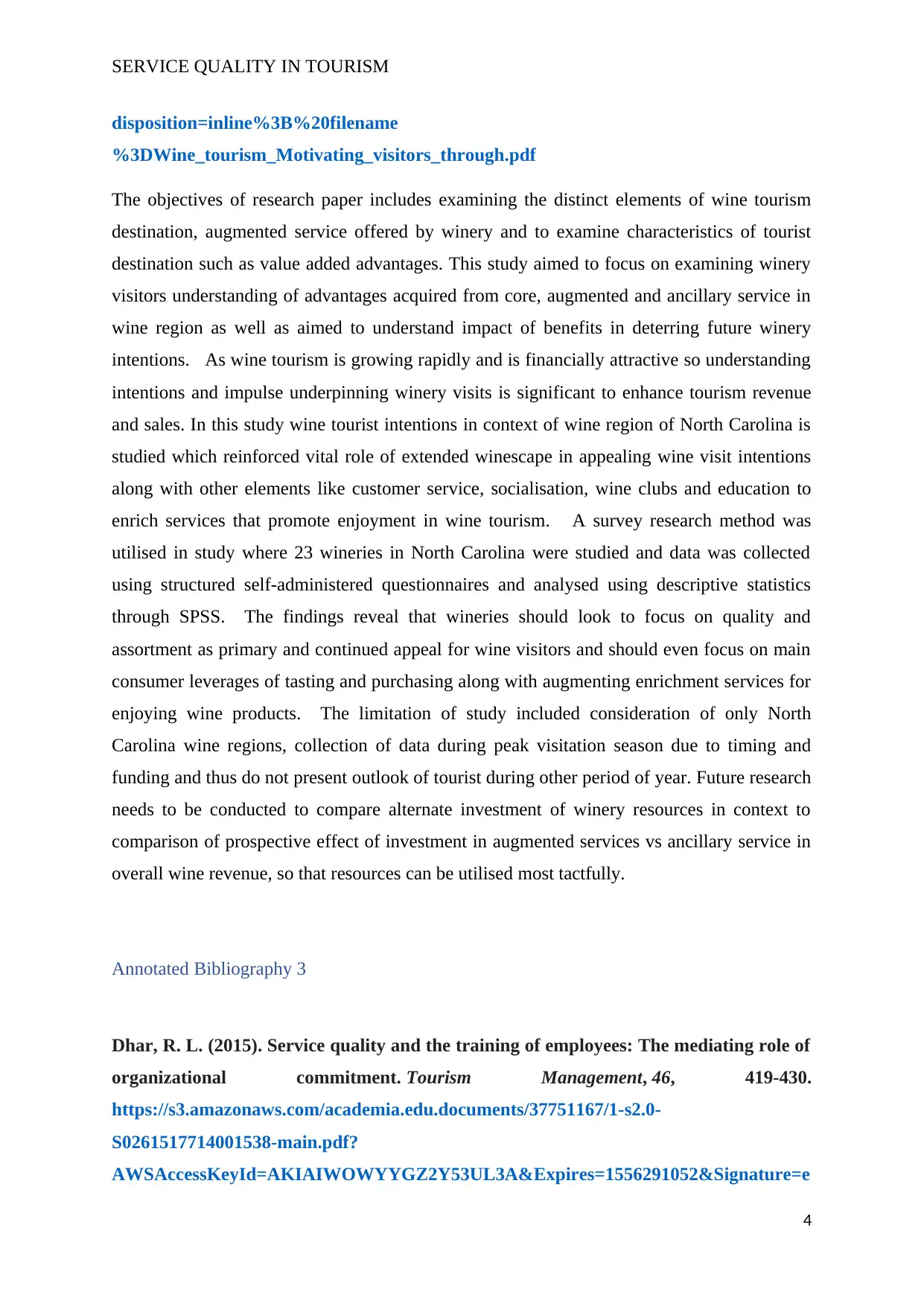
SERVICE QUALITY IN TOURISM
disposition=inline%3B%20filename
%3DWine_tourism_Motivating_visitors_through.pdf
The objectives of research paper includes examining the distinct elements of wine tourism
destination, augmented service offered by winery and to examine characteristics of tourist
destination such as value added advantages. This study aimed to focus on examining winery
visitors understanding of advantages acquired from core, augmented and ancillary service in
wine region as well as aimed to understand impact of benefits in deterring future winery
intentions. As wine tourism is growing rapidly and is financially attractive so understanding
intentions and impulse underpinning winery visits is significant to enhance tourism revenue
and sales. In this study wine tourist intentions in context of wine region of North Carolina is
studied which reinforced vital role of extended winescape in appealing wine visit intentions
along with other elements like customer service, socialisation, wine clubs and education to
enrich services that promote enjoyment in wine tourism. A survey research method was
utilised in study where 23 wineries in North Carolina were studied and data was collected
using structured self-administered questionnaires and analysed using descriptive statistics
through SPSS. The findings reveal that wineries should look to focus on quality and
assortment as primary and continued appeal for wine visitors and should even focus on main
consumer leverages of tasting and purchasing along with augmenting enrichment services for
enjoying wine products. The limitation of study included consideration of only North
Carolina wine regions, collection of data during peak visitation season due to timing and
funding and thus do not present outlook of tourist during other period of year. Future research
needs to be conducted to compare alternate investment of winery resources in context to
comparison of prospective effect of investment in augmented services vs ancillary service in
overall wine revenue, so that resources can be utilised most tactfully.
Annotated Bibliography 3
Dhar, R. L. (2015). Service quality and the training of employees: The mediating role of
organizational commitment. Tourism Management, 46, 419-430.
https://s3.amazonaws.com/academia.edu.documents/37751167/1-s2.0-
S0261517714001538-main.pdf?
AWSAccessKeyId=AKIAIWOWYYGZ2Y53UL3A&Expires=1556291052&Signature=e
4
disposition=inline%3B%20filename
%3DWine_tourism_Motivating_visitors_through.pdf
The objectives of research paper includes examining the distinct elements of wine tourism
destination, augmented service offered by winery and to examine characteristics of tourist
destination such as value added advantages. This study aimed to focus on examining winery
visitors understanding of advantages acquired from core, augmented and ancillary service in
wine region as well as aimed to understand impact of benefits in deterring future winery
intentions. As wine tourism is growing rapidly and is financially attractive so understanding
intentions and impulse underpinning winery visits is significant to enhance tourism revenue
and sales. In this study wine tourist intentions in context of wine region of North Carolina is
studied which reinforced vital role of extended winescape in appealing wine visit intentions
along with other elements like customer service, socialisation, wine clubs and education to
enrich services that promote enjoyment in wine tourism. A survey research method was
utilised in study where 23 wineries in North Carolina were studied and data was collected
using structured self-administered questionnaires and analysed using descriptive statistics
through SPSS. The findings reveal that wineries should look to focus on quality and
assortment as primary and continued appeal for wine visitors and should even focus on main
consumer leverages of tasting and purchasing along with augmenting enrichment services for
enjoying wine products. The limitation of study included consideration of only North
Carolina wine regions, collection of data during peak visitation season due to timing and
funding and thus do not present outlook of tourist during other period of year. Future research
needs to be conducted to compare alternate investment of winery resources in context to
comparison of prospective effect of investment in augmented services vs ancillary service in
overall wine revenue, so that resources can be utilised most tactfully.
Annotated Bibliography 3
Dhar, R. L. (2015). Service quality and the training of employees: The mediating role of
organizational commitment. Tourism Management, 46, 419-430.
https://s3.amazonaws.com/academia.edu.documents/37751167/1-s2.0-
S0261517714001538-main.pdf?
AWSAccessKeyId=AKIAIWOWYYGZ2Y53UL3A&Expires=1556291052&Signature=e
4
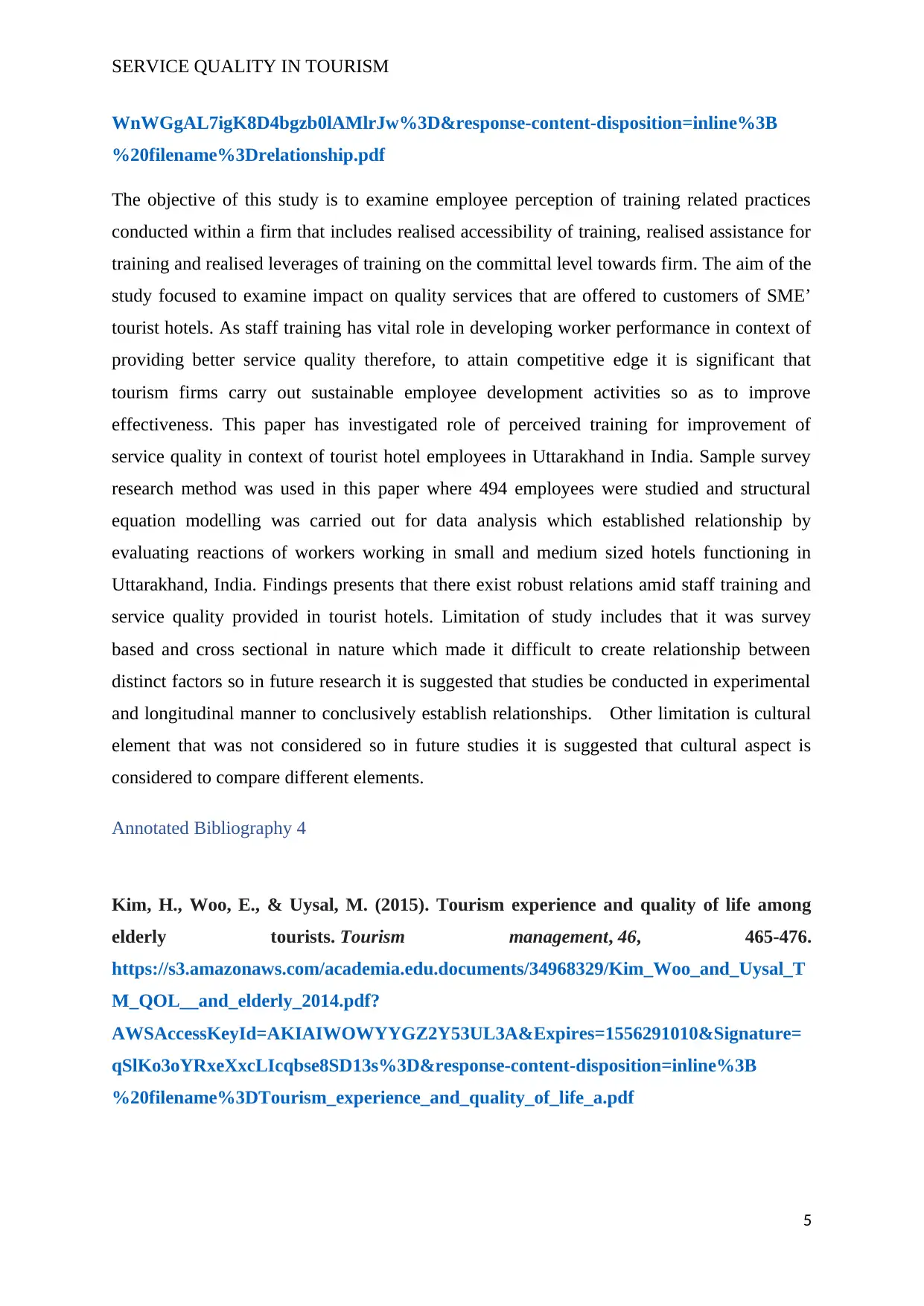
SERVICE QUALITY IN TOURISM
WnWGgAL7igK8D4bgzb0lAMlrJw%3D&response-content-disposition=inline%3B
%20filename%3Drelationship.pdf
The objective of this study is to examine employee perception of training related practices
conducted within a firm that includes realised accessibility of training, realised assistance for
training and realised leverages of training on the committal level towards firm. The aim of the
study focused to examine impact on quality services that are offered to customers of SME’
tourist hotels. As staff training has vital role in developing worker performance in context of
providing better service quality therefore, to attain competitive edge it is significant that
tourism firms carry out sustainable employee development activities so as to improve
effectiveness. This paper has investigated role of perceived training for improvement of
service quality in context of tourist hotel employees in Uttarakhand in India. Sample survey
research method was used in this paper where 494 employees were studied and structural
equation modelling was carried out for data analysis which established relationship by
evaluating reactions of workers working in small and medium sized hotels functioning in
Uttarakhand, India. Findings presents that there exist robust relations amid staff training and
service quality provided in tourist hotels. Limitation of study includes that it was survey
based and cross sectional in nature which made it difficult to create relationship between
distinct factors so in future research it is suggested that studies be conducted in experimental
and longitudinal manner to conclusively establish relationships. Other limitation is cultural
element that was not considered so in future studies it is suggested that cultural aspect is
considered to compare different elements.
Annotated Bibliography 4
Kim, H., Woo, E., & Uysal, M. (2015). Tourism experience and quality of life among
elderly tourists. Tourism management, 46, 465-476.
https://s3.amazonaws.com/academia.edu.documents/34968329/Kim_Woo_and_Uysal_T
M_QOL__and_elderly_2014.pdf?
AWSAccessKeyId=AKIAIWOWYYGZ2Y53UL3A&Expires=1556291010&Signature=
qSlKo3oYRxeXxcLIcqbse8SD13s%3D&response-content-disposition=inline%3B
%20filename%3DTourism_experience_and_quality_of_life_a.pdf
5
WnWGgAL7igK8D4bgzb0lAMlrJw%3D&response-content-disposition=inline%3B
%20filename%3Drelationship.pdf
The objective of this study is to examine employee perception of training related practices
conducted within a firm that includes realised accessibility of training, realised assistance for
training and realised leverages of training on the committal level towards firm. The aim of the
study focused to examine impact on quality services that are offered to customers of SME’
tourist hotels. As staff training has vital role in developing worker performance in context of
providing better service quality therefore, to attain competitive edge it is significant that
tourism firms carry out sustainable employee development activities so as to improve
effectiveness. This paper has investigated role of perceived training for improvement of
service quality in context of tourist hotel employees in Uttarakhand in India. Sample survey
research method was used in this paper where 494 employees were studied and structural
equation modelling was carried out for data analysis which established relationship by
evaluating reactions of workers working in small and medium sized hotels functioning in
Uttarakhand, India. Findings presents that there exist robust relations amid staff training and
service quality provided in tourist hotels. Limitation of study includes that it was survey
based and cross sectional in nature which made it difficult to create relationship between
distinct factors so in future research it is suggested that studies be conducted in experimental
and longitudinal manner to conclusively establish relationships. Other limitation is cultural
element that was not considered so in future studies it is suggested that cultural aspect is
considered to compare different elements.
Annotated Bibliography 4
Kim, H., Woo, E., & Uysal, M. (2015). Tourism experience and quality of life among
elderly tourists. Tourism management, 46, 465-476.
https://s3.amazonaws.com/academia.edu.documents/34968329/Kim_Woo_and_Uysal_T
M_QOL__and_elderly_2014.pdf?
AWSAccessKeyId=AKIAIWOWYYGZ2Y53UL3A&Expires=1556291010&Signature=
qSlKo3oYRxeXxcLIcqbse8SD13s%3D&response-content-disposition=inline%3B
%20filename%3DTourism_experience_and_quality_of_life_a.pdf
5
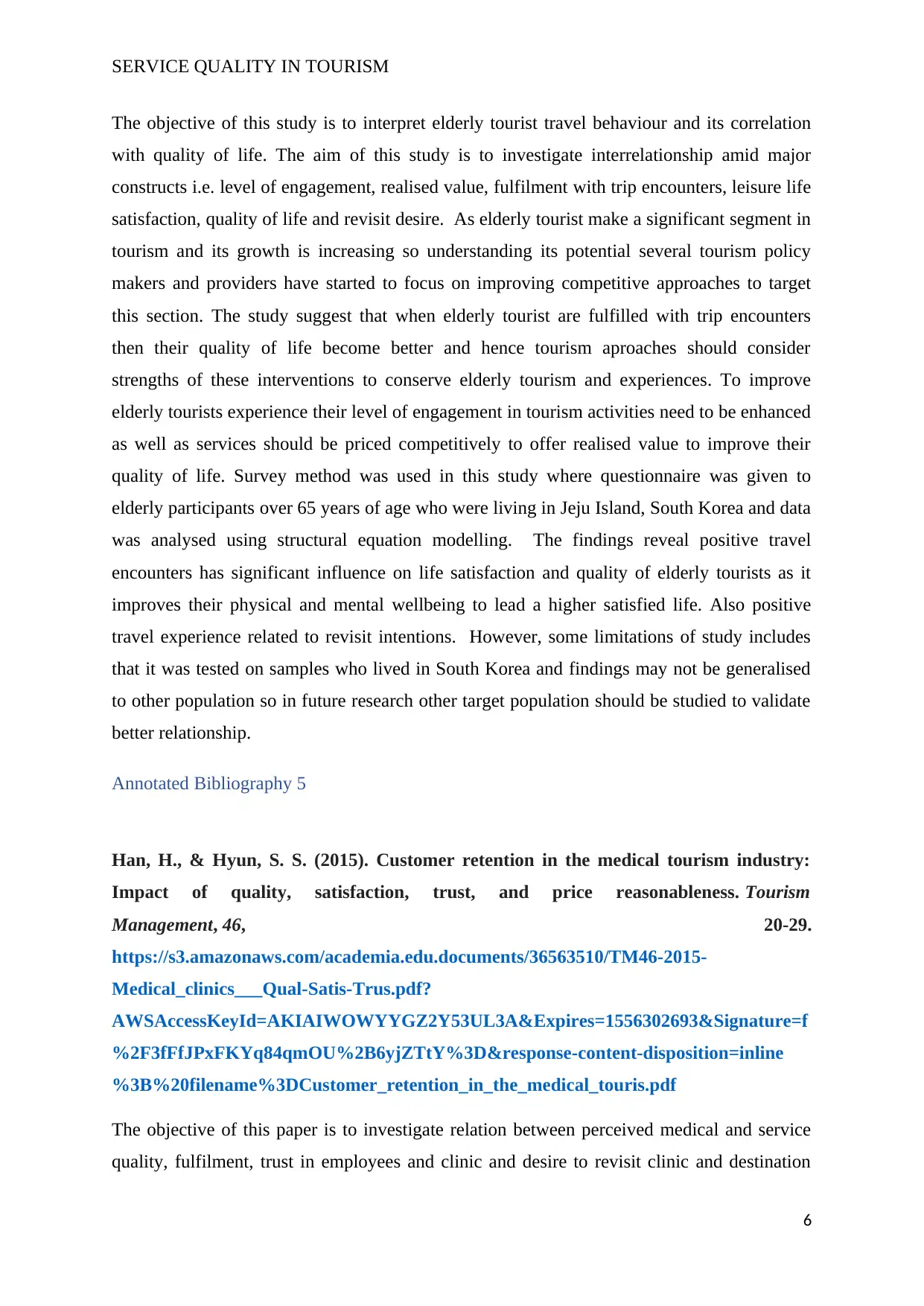
SERVICE QUALITY IN TOURISM
The objective of this study is to interpret elderly tourist travel behaviour and its correlation
with quality of life. The aim of this study is to investigate interrelationship amid major
constructs i.e. level of engagement, realised value, fulfilment with trip encounters, leisure life
satisfaction, quality of life and revisit desire. As elderly tourist make a significant segment in
tourism and its growth is increasing so understanding its potential several tourism policy
makers and providers have started to focus on improving competitive approaches to target
this section. The study suggest that when elderly tourist are fulfilled with trip encounters
then their quality of life become better and hence tourism aproaches should consider
strengths of these interventions to conserve elderly tourism and experiences. To improve
elderly tourists experience their level of engagement in tourism activities need to be enhanced
as well as services should be priced competitively to offer realised value to improve their
quality of life. Survey method was used in this study where questionnaire was given to
elderly participants over 65 years of age who were living in Jeju Island, South Korea and data
was analysed using structural equation modelling. The findings reveal positive travel
encounters has significant influence on life satisfaction and quality of elderly tourists as it
improves their physical and mental wellbeing to lead a higher satisfied life. Also positive
travel experience related to revisit intentions. However, some limitations of study includes
that it was tested on samples who lived in South Korea and findings may not be generalised
to other population so in future research other target population should be studied to validate
better relationship.
Annotated Bibliography 5
Han, H., & Hyun, S. S. (2015). Customer retention in the medical tourism industry:
Impact of quality, satisfaction, trust, and price reasonableness. Tourism
Management, 46, 20-29.
https://s3.amazonaws.com/academia.edu.documents/36563510/TM46-2015-
Medical_clinics___Qual-Satis-Trus.pdf?
AWSAccessKeyId=AKIAIWOWYYGZ2Y53UL3A&Expires=1556302693&Signature=f
%2F3fFfJPxFKYq84qmOU%2B6yjZTtY%3D&response-content-disposition=inline
%3B%20filename%3DCustomer_retention_in_the_medical_touris.pdf
The objective of this paper is to investigate relation between perceived medical and service
quality, fulfilment, trust in employees and clinic and desire to revisit clinic and destination
6
The objective of this study is to interpret elderly tourist travel behaviour and its correlation
with quality of life. The aim of this study is to investigate interrelationship amid major
constructs i.e. level of engagement, realised value, fulfilment with trip encounters, leisure life
satisfaction, quality of life and revisit desire. As elderly tourist make a significant segment in
tourism and its growth is increasing so understanding its potential several tourism policy
makers and providers have started to focus on improving competitive approaches to target
this section. The study suggest that when elderly tourist are fulfilled with trip encounters
then their quality of life become better and hence tourism aproaches should consider
strengths of these interventions to conserve elderly tourism and experiences. To improve
elderly tourists experience their level of engagement in tourism activities need to be enhanced
as well as services should be priced competitively to offer realised value to improve their
quality of life. Survey method was used in this study where questionnaire was given to
elderly participants over 65 years of age who were living in Jeju Island, South Korea and data
was analysed using structural equation modelling. The findings reveal positive travel
encounters has significant influence on life satisfaction and quality of elderly tourists as it
improves their physical and mental wellbeing to lead a higher satisfied life. Also positive
travel experience related to revisit intentions. However, some limitations of study includes
that it was tested on samples who lived in South Korea and findings may not be generalised
to other population so in future research other target population should be studied to validate
better relationship.
Annotated Bibliography 5
Han, H., & Hyun, S. S. (2015). Customer retention in the medical tourism industry:
Impact of quality, satisfaction, trust, and price reasonableness. Tourism
Management, 46, 20-29.
https://s3.amazonaws.com/academia.edu.documents/36563510/TM46-2015-
Medical_clinics___Qual-Satis-Trus.pdf?
AWSAccessKeyId=AKIAIWOWYYGZ2Y53UL3A&Expires=1556302693&Signature=f
%2F3fFfJPxFKYq84qmOU%2B6yjZTtY%3D&response-content-disposition=inline
%3B%20filename%3DCustomer_retention_in_the_medical_touris.pdf
The objective of this paper is to investigate relation between perceived medical and service
quality, fulfilment, trust in employees and clinic and desire to revisit clinic and destination
6
Paraphrase This Document
Need a fresh take? Get an instant paraphrase of this document with our AI Paraphraser
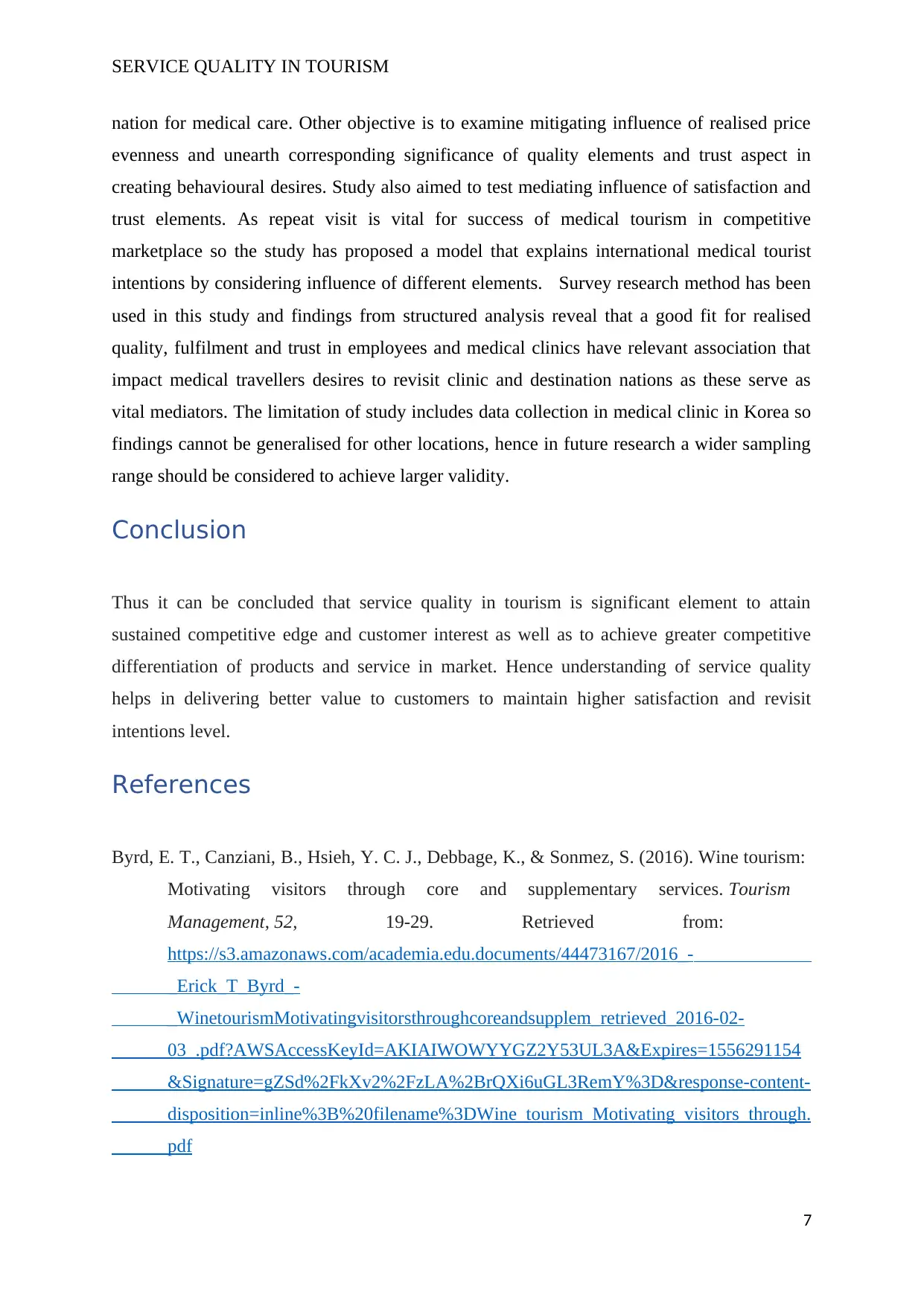
SERVICE QUALITY IN TOURISM
nation for medical care. Other objective is to examine mitigating influence of realised price
evenness and unearth corresponding significance of quality elements and trust aspect in
creating behavioural desires. Study also aimed to test mediating influence of satisfaction and
trust elements. As repeat visit is vital for success of medical tourism in competitive
marketplace so the study has proposed a model that explains international medical tourist
intentions by considering influence of different elements. Survey research method has been
used in this study and findings from structured analysis reveal that a good fit for realised
quality, fulfilment and trust in employees and medical clinics have relevant association that
impact medical travellers desires to revisit clinic and destination nations as these serve as
vital mediators. The limitation of study includes data collection in medical clinic in Korea so
findings cannot be generalised for other locations, hence in future research a wider sampling
range should be considered to achieve larger validity.
Conclusion
Thus it can be concluded that service quality in tourism is significant element to attain
sustained competitive edge and customer interest as well as to achieve greater competitive
differentiation of products and service in market. Hence understanding of service quality
helps in delivering better value to customers to maintain higher satisfaction and revisit
intentions level.
References
Byrd, E. T., Canziani, B., Hsieh, Y. C. J., Debbage, K., & Sonmez, S. (2016). Wine tourism:
Motivating visitors through core and supplementary services. Tourism
Management, 52, 19-29. Retrieved from:
https://s3.amazonaws.com/academia.edu.documents/44473167/2016_-
_Erick_T_Byrd_-
_WinetourismMotivatingvisitorsthroughcoreandsupplem_retrieved_2016-02-
03_.pdf?AWSAccessKeyId=AKIAIWOWYYGZ2Y53UL3A&Expires=1556291154
&Signature=gZSd%2FkXv2%2FzLA%2BrQXi6uGL3RemY%3D&response-content-
disposition=inline%3B%20filename%3DWine_tourism_Motivating_visitors_through.
pdf
7
nation for medical care. Other objective is to examine mitigating influence of realised price
evenness and unearth corresponding significance of quality elements and trust aspect in
creating behavioural desires. Study also aimed to test mediating influence of satisfaction and
trust elements. As repeat visit is vital for success of medical tourism in competitive
marketplace so the study has proposed a model that explains international medical tourist
intentions by considering influence of different elements. Survey research method has been
used in this study and findings from structured analysis reveal that a good fit for realised
quality, fulfilment and trust in employees and medical clinics have relevant association that
impact medical travellers desires to revisit clinic and destination nations as these serve as
vital mediators. The limitation of study includes data collection in medical clinic in Korea so
findings cannot be generalised for other locations, hence in future research a wider sampling
range should be considered to achieve larger validity.
Conclusion
Thus it can be concluded that service quality in tourism is significant element to attain
sustained competitive edge and customer interest as well as to achieve greater competitive
differentiation of products and service in market. Hence understanding of service quality
helps in delivering better value to customers to maintain higher satisfaction and revisit
intentions level.
References
Byrd, E. T., Canziani, B., Hsieh, Y. C. J., Debbage, K., & Sonmez, S. (2016). Wine tourism:
Motivating visitors through core and supplementary services. Tourism
Management, 52, 19-29. Retrieved from:
https://s3.amazonaws.com/academia.edu.documents/44473167/2016_-
_Erick_T_Byrd_-
_WinetourismMotivatingvisitorsthroughcoreandsupplem_retrieved_2016-02-
03_.pdf?AWSAccessKeyId=AKIAIWOWYYGZ2Y53UL3A&Expires=1556291154
&Signature=gZSd%2FkXv2%2FzLA%2BrQXi6uGL3RemY%3D&response-content-
disposition=inline%3B%20filename%3DWine_tourism_Motivating_visitors_through.
7
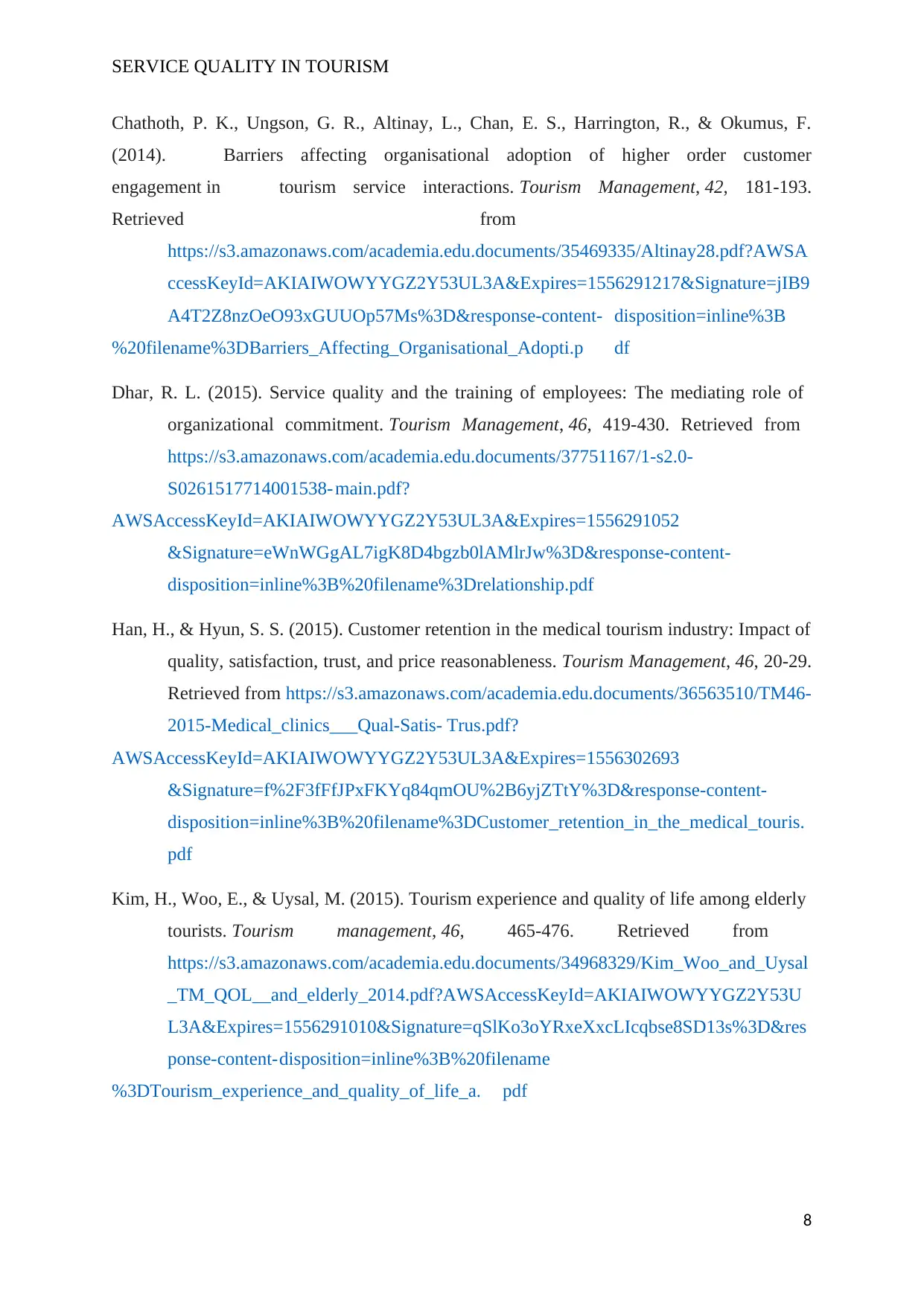
SERVICE QUALITY IN TOURISM
Chathoth, P. K., Ungson, G. R., Altinay, L., Chan, E. S., Harrington, R., & Okumus, F.
(2014). Barriers affecting organisational adoption of higher order customer
engagement in tourism service interactions. Tourism Management, 42, 181-193.
Retrieved from
https://s3.amazonaws.com/academia.edu.documents/35469335/Altinay28.pdf?AWSA
ccessKeyId=AKIAIWOWYYGZ2Y53UL3A&Expires=1556291217&Signature=jIB9
A4T2Z8nzOeO93xGUUOp57Ms%3D&response-content- disposition=inline%3B
%20filename%3DBarriers_Affecting_Organisational_Adopti.p df
Dhar, R. L. (2015). Service quality and the training of employees: The mediating role of
organizational commitment. Tourism Management, 46, 419-430. Retrieved from
https://s3.amazonaws.com/academia.edu.documents/37751167/1-s2.0-
S0261517714001538- main.pdf?
AWSAccessKeyId=AKIAIWOWYYGZ2Y53UL3A&Expires=1556291052
&Signature=eWnWGgAL7igK8D4bgzb0lAMlrJw%3D&response-content-
disposition=inline%3B%20filename%3Drelationship.pdf
Han, H., & Hyun, S. S. (2015). Customer retention in the medical tourism industry: Impact of
quality, satisfaction, trust, and price reasonableness. Tourism Management, 46, 20-29.
Retrieved from https://s3.amazonaws.com/academia.edu.documents/36563510/TM46-
2015-Medical_clinics___Qual-Satis- Trus.pdf?
AWSAccessKeyId=AKIAIWOWYYGZ2Y53UL3A&Expires=1556302693
&Signature=f%2F3fFfJPxFKYq84qmOU%2B6yjZTtY%3D&response-content-
disposition=inline%3B%20filename%3DCustomer_retention_in_the_medical_touris.
pdf
Kim, H., Woo, E., & Uysal, M. (2015). Tourism experience and quality of life among elderly
tourists. Tourism management, 46, 465-476. Retrieved from
https://s3.amazonaws.com/academia.edu.documents/34968329/Kim_Woo_and_Uysal
_TM_QOL__and_elderly_2014.pdf?AWSAccessKeyId=AKIAIWOWYYGZ2Y53U
L3A&Expires=1556291010&Signature=qSlKo3oYRxeXxcLIcqbse8SD13s%3D&res
ponse-content-disposition=inline%3B%20filename
%3DTourism_experience_and_quality_of_life_a. pdf
8
Chathoth, P. K., Ungson, G. R., Altinay, L., Chan, E. S., Harrington, R., & Okumus, F.
(2014). Barriers affecting organisational adoption of higher order customer
engagement in tourism service interactions. Tourism Management, 42, 181-193.
Retrieved from
https://s3.amazonaws.com/academia.edu.documents/35469335/Altinay28.pdf?AWSA
ccessKeyId=AKIAIWOWYYGZ2Y53UL3A&Expires=1556291217&Signature=jIB9
A4T2Z8nzOeO93xGUUOp57Ms%3D&response-content- disposition=inline%3B
%20filename%3DBarriers_Affecting_Organisational_Adopti.p df
Dhar, R. L. (2015). Service quality and the training of employees: The mediating role of
organizational commitment. Tourism Management, 46, 419-430. Retrieved from
https://s3.amazonaws.com/academia.edu.documents/37751167/1-s2.0-
S0261517714001538- main.pdf?
AWSAccessKeyId=AKIAIWOWYYGZ2Y53UL3A&Expires=1556291052
&Signature=eWnWGgAL7igK8D4bgzb0lAMlrJw%3D&response-content-
disposition=inline%3B%20filename%3Drelationship.pdf
Han, H., & Hyun, S. S. (2015). Customer retention in the medical tourism industry: Impact of
quality, satisfaction, trust, and price reasonableness. Tourism Management, 46, 20-29.
Retrieved from https://s3.amazonaws.com/academia.edu.documents/36563510/TM46-
2015-Medical_clinics___Qual-Satis- Trus.pdf?
AWSAccessKeyId=AKIAIWOWYYGZ2Y53UL3A&Expires=1556302693
&Signature=f%2F3fFfJPxFKYq84qmOU%2B6yjZTtY%3D&response-content-
disposition=inline%3B%20filename%3DCustomer_retention_in_the_medical_touris.
Kim, H., Woo, E., & Uysal, M. (2015). Tourism experience and quality of life among elderly
tourists. Tourism management, 46, 465-476. Retrieved from
https://s3.amazonaws.com/academia.edu.documents/34968329/Kim_Woo_and_Uysal
_TM_QOL__and_elderly_2014.pdf?AWSAccessKeyId=AKIAIWOWYYGZ2Y53U
L3A&Expires=1556291010&Signature=qSlKo3oYRxeXxcLIcqbse8SD13s%3D&res
ponse-content-disposition=inline%3B%20filename
%3DTourism_experience_and_quality_of_life_a. pdf
8
1 out of 9
Related Documents
Your All-in-One AI-Powered Toolkit for Academic Success.
+13062052269
info@desklib.com
Available 24*7 on WhatsApp / Email
![[object Object]](/_next/static/media/star-bottom.7253800d.svg)
Unlock your academic potential
© 2024 | Zucol Services PVT LTD | All rights reserved.





